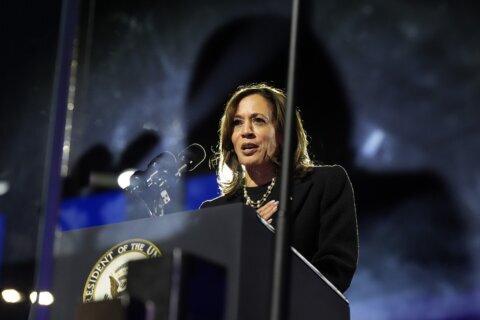The following information is provided by Graphiq and InsideGov.

By Jack Corrigan
It’s official — America has its general election tickets. Last week, Hillary Clinton tapped Virginia Sen. Tim Kaine as her running mate, bringing a swing-state centrist to the first woman-led presidential ticket for a major party. As a level-headed moderate, Kaine stands out in an election that’s set both parties on fire with impassioned rhetoric and talk of political revolutions. The country will meet him during his prime-time speech Wednesday night at the Democratic National Convention in Philadelphia.
While he’s a new face for many Americans, Kaine is no rookie. He’s held executive office since 1998, when he was elected mayor of Richmond, Virginia. Before winning his Senate seat in 2012, Kaine served as Virginia’s lieutenant governor and governor. He also chaired the Democratic National Committee from 2009 to 2011. The man has never lost an election.
It promises to be a contentious few months between Clinton-Kaine and the Republican ticket of Donald Trump and Indiana Gov. Mike Pence. But aside from a long political resume, what exactly does Kaine bring to the Democratic ticket? Graphiq’s politics site InsideGov will get you up to speed with a Tim Kaine cheat sheet, outlining the facts and figures behind the potential next vice president of the United States.
Trouble with trade
One of the biggest issues liberals have taken with Kaine is his stance on trade — the senator supported the Trans-Pacific Partnership, the trade deal that both Trump and Vermont Sen. Bernie Sanders lambasted throughout the primaries. They claim the deal puts the interests of rich, multi-national corporations before those of American workers.
Kaine publicly praised the TPP less than 24 hours before being named as Clinton’s VP, calling it “an upgrade of labor standards… environmental standards… and intellectual property protections.” However, he’s reportedly reversed his support after being selected as vice president, falling in line with Clinton’s position. In 2012, Clinton called the TPP “the gold standard of trade agreements,” but after beginning her presidential run, she said she couldn’t endorse the deal “in its current form.”
He’s progressive, but not radical
As a 58-year-old white man who describes himself as “boring,” Kaine isn’t the progressive firebrand or diverse politico many expected to see on the Democratic ticket. The liberal wing of the party, which hoped Sanders or Massachusetts Sen. Elizabeth Warren would get the nod, has expressed its disappointment with Clinton’s choice.
A few of Kaine’s views stray from the party platform — he supports expanding the military and sees marijuana as a gateway drug. He is also personally opposed to abortion, but still supports Planned Parenthood and pro-choice policies. Beyond that, Kaine aligns with Clinton and the Democrats on most issues.
A devout Catholic, Kaine has also built strong ties with diverse communities through his faith. He took a year off law school to do missionary work in Honduras, where he taught carpentry and welding, and became fluent in Spanish. Back home in Richmond, Kaine sings in the choir at St. Elizabeth Catholic Church. He and his wife have been involved members of the predominantly African-American church for more than 30 years. It’s where the Kaines were married and their children were baptized.
People like him
During his time as senator, Kaine has enjoyed consistently positive approval ratings. Currently, 53 percent of Virginians approve of the job he’s doing, compared to 25 percent who disapprove. Virginia is a swing state, so Kaine’s popularity could help to turn the state blue in the general election.
His likability also extends to both sides of the aisle on Capitol Hill. Kaine is a respected member of both the Senate Armed Services and Foreign Relations committees, and he frequently works across party lines. In a 2014 interview with Politico, Kaine said that he and hardline conservative Ted Cruz, the Texas senator who was runner-up in this year’s GOP presidential contest, “get along great.” Even former Arkansas Gov. Mike Huckabee, a staunchly conservative Republican who’s never worked with Kaine, called the senator “an honorable guy.”
Kaine’s ability to get things done and endear himself to those who may not agree with him might prove crucial in the 2016 race. Clinton’s net favorability rating stands at -17 percent, and a personable vice president could help offset that.
Trump’s criticism
Just as he did with “Little Marco,” “Lyin’ Ted” and “Crooked Hillary,” Trump wasted no time coming up with a nickname for the Democratic VP nominee: “Corrupt Kaine.” Trump charged that Kaine accepted over $160,000 in gifts during his time as governor of Virginia, taking advantage of the state’s “lax gift laws.” In a “Meet the Press” interview, the Republican nominee compared Kaine to former Virginia Gov. Bob McDonnell, who was tried for accepting cash and gifts during his tenure as governor and attorney general. Trump claimed “McDonnell took a fraction of what Kaine took.”
But that’s not true. According to Politifact, a political fact-checking website, McDonnell accepted $452,707 in gifts during his time in office, while Kaine received $162,083 worth of gifts. Kaine disclosed everything he was given, but McDonnell failed to disclose $177,000 of the gifts he received. Before 2015, Virginia politicians were allowed to accept gifts as long as they were disclosed to the public, making what Kaine did completely legal.
More: The 2016 Democratic Convention by the Numbers
Follow InsideGov on Twitter: @inside_gov
Research More About the 2016 Presidential Election







